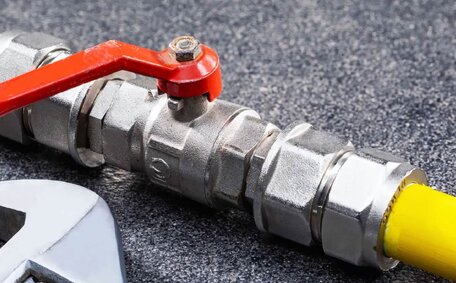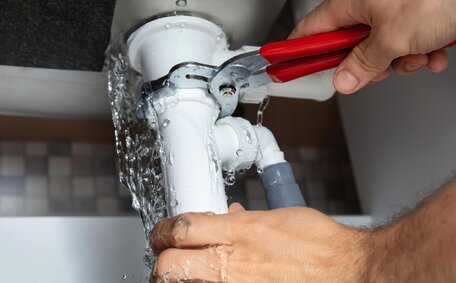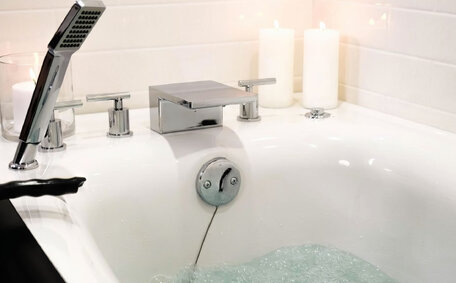Introduction to Preventing Plumbing Emergencies
Taking proactive steps to prevent plumbing emergencies is essential for safeguarding your home and saving on repair costs. Tackling small problems promptly can stave off major disasters, making preventive measures critical.
Regularly inspecting your plumbing pipes for leaks, clogs, and wear can catch small issues before they escalate into costly emergencies. Simple actions such as checking for leaks to avoid inflated water bills, unclogging drains, and maintaining proper water pressure can prevent water damage and more serious issues.
It is also key to understand the importance of properly managing your plumbing system. Don’t use your sink to dispose of fats, oils, and harsh chemicals. Only dispose of biodegradable tissue and human waste in the toilet to prevent blockages.
Avoid overloading washing machines and using excessive toilet paper to prevent straining your plumbing.
Familiarise yourself with the process of quickly shutting off your home’s water supply in the event of a burst pipe or other urgent situation. The quicker you can halt the stream of water, the more you’ll protect your property from the extensive damage caused by burst pipes.
Adhering to these preventative measures and scheduling regular check-ups from reputable plumbers can fortify your home against potential damages. By being vigilant and attentive, you can detect plumbing problems early and pre-empt emergencies, thus protecting your home and finances.
Understand Your Home’s Plumbing System
You must know the layout of your home’s plumbing system to pinpoint and address any issues before they evolve into emergencies. It’s a good idea to know where your main water valve, pipes, and fixtures are situated to help you promptly shut off water and reduce potential damage from leaks or bursts.
In Mosman homes built in the 1920s-1950s, galvanised steel pipes were commonly used. Corrosion and other factors can cause pipes to develop leaks over time.
Being aware of this risk allows Mosman homeowners to be vigilant about checking for drips or drops in water pressure that signal a leak. Detecting leaks early can prevent them from turning into major pipe bursts that could flood your home.
Make a concerted effort to map your main pipework and ensure easy access to the water shut-off mechanism for emergencies. Understanding your plumbing layout means your pipes can be swiftly managed during an emergency, preventing costly damage.
Ensure the shut-off valve is functional and accessible to quickly halt the water supply and prevent escalating issues like overflowing drains. Additionally, pinpoint the locations of specific shut-off valves like the cold water supply valve for sinks and toilets.
Regular Plumbing Maintenance
It’s essential to engage in regular plumbing maintenance to prevent plumbing emergencies and promote the health of your system. A professional plumber inspecting all pipes, drains, shut-off valves, your septic tank, and water-based appliances biannually can help catch problems before they worsen.
Plumbers primarily look for leaks during inspections. Even small drips can gradually lead to water damage or corroded pipes becoming serious problems. A plumber can detect and repair minor issues like leaks to prevent major pipe bursts down the line.
Plumbers also check for gradual buildup and obstructions that can limit water flow in drains or water line components. Clearing drains and pipes helps improve drainage and water pressure.
Replacing worn out parts like washers, o-rings and flappers during maintenance checks prevents breakdowns leading to flooding. Routine inspections of water heaters for sediment buildup ensures efficiency and safety.
Investing in regular plumbing maintenance extends the lifespan of your pipes, ensuring optimal functionality with each use. Permitting a plumber to maintain your plumbing in top condition can ward off emergencies that can happen unexpectedly.
Inspect Pipes and Fixtures
Conducting regular visual inspections of your home’s pipes and plumbing fixtures is an easy way to catch issues before they worsen. Flush your toilet and operate basins to listen for unsettling sounds that might suggest impediments or wear.
Investigate alongside visible ducts, and ensure your sump pump is functioning, maintaining vigilance for warning signs of leaks like damp patches, oxidation, or humidity. Check under sinks for any pooling water, which can signal a slow drip. Run your taps to thoroughly scrutinise water distribution and pressure.
Conduct a close inspection of fixtures for cracks, corrosion, and loose connections, and act swiftly to make any necessary repairs. Watch for drips or moisture around water heaters that could signify a leak. Miniscule concerns such as sealant deficiencies can, if neglected, intensify into substantial leaks or eruptions - this illustrates how avoid minor concerns turning into crises.
Should your pipes or fixtures show signs of wear, it’s wise to call professional assistance without hesitation. If you notice worrying signs in your system, it’s time to search for a local plumber to promptly assess and fix the issue.
Having a professional inspect your plumbing yearly helps detect concealed problems within walls or underground. Don’t hesitate to call Mosman Plumbing if you have any concerns about your plumbing.
They can thoroughly scrutinise your whole system using specialised tools and expertise. Proactive maintenance oversight keeps any plumbing tribulations from devolving into pressing crises.
Unclog Drains
Clogged drains are common plumbing challenges that can quickly escalate to emergencies for homeowners. Left untreated, clogs can lead to backed up sewer lines and costly repairs. There are several methods for clearing mildly blocked drains yourself before calling a professional.
Begin addressing a clogged drain by removing the stopper or screen and clearing out any large debris, such as food scraps. Attempt plunging the drain with a sink plunger or drain snake to displace the blockage into your pipe system. Instead, pour a half cup of baking soda down the drain followed by a cup of vinegar.
Avoid harsh chemical drain cleaners that can eat through your pipes. Cover and let sit 15 minutes before flushing with hot water.
For tub or shower drains, remove hair from the drain catch and plunge the drain. Mix 1 cup salt with a gallon boiling water and pour down the drain to dissolve soap scum. A monthly treatment of 1/2 cup baking soda followed by a cup of vinegar will help keep drains clear.
If multiple attempts to clear a mild clog fail, do not hesitate to call a plumber like Mosman Plumbing. Persistent obstructions or frequent clogs necessitate a comprehensive drain service to entirely eradicate the blockage without harming pipes.
Drain Water Heaters
Draining your water heater annually is crucial maintenance to remove sediment buildup and maintain efficiency. Over time, minerals from water can accumulate at the bottom of the tank, reducing heating capacity. Draining your water heater annually is crucial maintenance to remove sediment buildup and maintain efficiency. Attach a garden hose to your water heater’s drain valve and lead it outside or to a drain to carry away the stored water. Open the relief valve at the top to allow air in and let water flow out through the drain valve until empty.
Flush the tank by running water through it for a few minutes. Close valves, refill the tank, restore power and test that normal operation resumes. Seek professional help if unsure to avoid damage.
Avoid Harsh Chemicals
Numerous commercial drain cleaners are made with corrosive substances such as lye, sulphuric acid, or hydrochloric acid. While they may be effective in unclogging, these chemicals can damage pipes, causing deterioration with each passing moment. The fumes can also be toxic and harmful if inhaled.
For a safer alternative, try using a mechanical drain snake to physically remove obstructions. Bio-enzymatic drain cleaners that contain bacteria and enzymes to dissolve organic matter can also be effective while being pipe-friendly.
Avoid pouring grease down drains by disposing it in the garbage when cooled. Maintaining protective drain screens and strainers can also prevent buildup of hair and debris that leads to clogs. When faced with stubborn clogs, don’t hesitate to call a professional plumber for a thorough inspection and safe clearance of your drains.
Proper Use of Drains and Disposals
Careful management of your kitchen garbage disposal and sinks is key to avoiding blockages that can lead to plumbing disasters. Also stay clear of dropping egg shells, rice, pasta, coffee grounds, or fibrous vegetables like celery down drain, as these can jam up.
Permit fats to cool and solidify before discarding in the trash, following tips to prevent plumbing issues your kitchen might face. Run a steady stream of cold water when using the garbage disposal to avoid overloading the system. Eschew discharging fats oils, or grease into drains, a practice ensuring solidity and coating of conduits.
Only put biodegradable food scraps down the disposal in moderation. Alternate use with running the faucet normally.
After using the disposal, allow water to run through for 30 seconds to cleanse the drain line. Routinely fill the sink halfway with water and a spoonful of baking soda then vinegar. After using the disposal, allow water to run through for 30 seconds to cleanse the drain line.
To keep your drains clear, minimise disposal use by composting food waste whenever possible. Avoid chemical drain cleaners.
Should drains appear slow, employ a plunger or a drain snake to clear any blockages. Should drains appear slow, employ a plunger or a drain snake to clear any blockages.
Avoid Flushing Improper Items
Flushing anything besides biodegradable items can very easily lead to clogged drains and sewer backups. Numerous household items stamped as 'flushable’ like wipes, diapers, and paper towels do not disintegrate swiftly and issues can arise when they lodge in pipes.
Avoid flushing:
- Baby wipes and 'flushable’ wipes
- Paper towels or napkins
- Tissues
- Dental floss
- Diapers
- Sanitary products
- Cotton balls & swabs
- Kitty litter
These foreign objects can latch onto ducts, amass residue, and lead to blockages. Even products marketed as flushable may take much longer to disintegrate than toilet paper. Over time, repeatedly flushing unsuitable items without steps to prevent frozen pipes can lead to severe blockages and issues within home plumbing and the public sewer system.
Dispose of other items in the trash where they should go instead.
Use Drain Strainers
These devices catch hair, food particles, and other debris before it goes down the drain and gets stuck.
Over time, buildup in drains that’s not caught by a strainer can impede water flow and require a costly visit from a plumber.
For sinks, a basket style strainer that sits inside the drain opening works well to trap scraps.
Take strainers out periodically to remove collected gunk and rinse clean.
Make drain strainer use a habit, especially in frequently used sinks and showers.
Having them installed properly catches debris and keeps it from accumulating in pipes where it can cause major clogs. An ounce of prevention goes a long way - a minor investment in drain strainers now can save on plumbing emergencies down the road.
Look for strainers that fit over or inside drains and can be easily removed for sily removed for cleaning.
Winterizing Your Plumbing
During cold months in climates like Mosman, it’s essential to winterize your plumbing to protect against weather-related damage. Use store-bought foam tubing or weatherproof tape to wrap pipes, securing carefully to avoid kinks that impede water flow.
Begin by insulating exposed pipes outside your residence and in unheated zones such as attics or crawlspaces. Suitable insulation safeguards your water pipes from freezing and potential ruptures as temperatures drop.
Also make sure to disconnect garden hoses and drain any exterior pipes or faucets. Install insulated faucet covers and take measures to prevent frozen pipes, such as leaving outdoor faucets open to allow residual water to drain out. Shutting off and draining water to outside spigots prevents freezing and cracks that lead to costly leaks.
Within your residence, have a clear understanding of how to shut off water to your home rapidly if a pipe bursts. Get your plumbing system examined by experts such as Mosman Plumbing before winter to pinpoint any wear or issues that could cut off water to your home.
This allows you to quickly turn off water and minimise flooding damage. Performing seasonal maintenance helps avoid emergencies when pipes are most vulnerable.
A few preventive steps can protect your plumbing during winter months and harsh cold snaps. Insulate pipes properly, drain exterior lines, and prepare to shut off main water if needed. Contact trusted local plumbers like Mosman Plumbing if you have any concerns about getting your plumbing winter-ready.
Have a Plumber on Call
Having an emergency plumber on call can be of immense value when plumbing emergencies your household encounters. Building rapport with a credible local plumber like Mosman Plumbing delivers peace of mind, ensuring aid is merely a call away should your pipes rupture, drains become blocked, or other emergencies unfold.
On-call plumbers, experienced in dealing plumbing emergencies, can respond rapidly when every minute counts. Your plumber’s proficiency in dealing with issues allows them to rapidly identify problems and implement solutions to reduce water damage at any time and prevent further deterioration. They have the expertise to restore proper plumbing function and get your household back to normal.
Discuss emergency response alternatives when you schedule systematic upholding of your system, be it in Mosman or closer to the gold coast. Confirm they offer 24/7 availability so you can easily reach them if disaster strikes at night or on weekends. Having a dependable plumber on standby can simplify your life, providing peace of mind and mitigating stress when plumbing difficulties materialise.
Create a Plumbing Emergency Kit
Having a plumbing emergency kit ready can help minimise damage when issues arise. Keep it in an easily accessible spot like under the sink or in the garage. Include these useful items:
- Plunger - For clearing simple drain clogs
- Drain snake - For pulling out more stubborn obstructions
- Adjustable wrench - For tightening leaky joints or valves
- Pipe wrench - For turning off main water valve
- Flashlight - For seeing in dark spaces while inspecting or repairing pipes
- Duct tape - For temporary seals on small leaks
- Pipe sealant or epoxy - For sealing cracks and holes
- Buckets - For catching water from leaks
- Towels - For soaking up small spills
- Protective goggles - For eye safety when working
Having these basic tools on hand lets you take immediate action during plumbing mishaps while waiting for professional assistance. But remember, they are temporary measures only - be sure to call Mosman Plumbing to properly inspect and repair any underlying issues.
Having a plumbing emergency kit ready can help minimise damage when issues arise. Include these useful items:
Plunger - For clearing simple drain clogsDrain snake - For pulling out more stubborn obstructionsAdjustable wrench - F2>Know Where Your Shutoff Valve Is When every second counts during a plumbing emergency, knowing exactly where your home’s main water shutoff valve is located can prevent catastrophic water damage. Dedicate moments to markedly tag the supply valve, assuring its easy approachability, and ensure no obstructions like crates or furnishings blockade it. Frantically searching for the shutoff while your basement floods allows a minor plumbing issue to become a major inundation.
Test intermittently to ensure that the valve stops the water flow — understanding plumbing emergencies how swiftly you react can be a lifesaver. Tens of thousands of litres may discharge in fleeting moments from a bursting pipe, leading to plumbing emergencies; knowing how swiftly you react matters.
Familiarise every household member with the precise location of the shutoff valve. Prioritize locating and using your home’s shut-off valve for plumbing emergency preparedness.
Rapidly turning off water supply is crucial in managing leaks bursts, diminishing the scale of potential repairs. Severe water damage can mandate mould correction and broad refurbishments, equating to a lot money spent, avoidable by promptly halting the water flow.
Conclusion
Preventive practices and awareness of your systems intricacies can save lot money typically lost to plumbing calamities. Routine inspections to identify leaks promptly and clearing drain obstructions can prevent minor issues from escalating. Understanding your pipe layout allows you to quickly shut off water during emergencies minimising damage. Having a plumber on hand to take care of unexpected complications ensures assistance is there around the clock. Routine inspections to identify leaks promptly and clearing drain obstructions can prevent minor issues from escalating. Should you need professional help with your plumbing, read here how to contact Mosman Plumbing via phone, email, or book an appointment.
Invest time to locate valves and label them clearly. Use drain strainers to catch debris. Keep a plumbing emergency kit on hand, equipped with tools for efficient management and post-job cleanup. Never pour fats, oils, or harsh chemicals down sinks.






